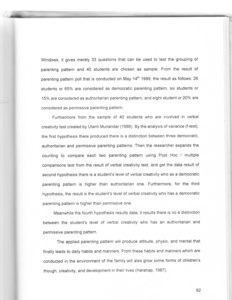Kumala, Feronicha Fina (1999) Perbandingan tingkat kreativitas verbal pada mahasiswa psikologi yang mengalami pola asuh demokratis, otoriter, dan permisif: Suatu studi mengenai pola asuh yang diterapkan orangtua terhadap tingkat kreativitas verbal pada mahasiswa tingkat I Fakultas Psikologi UNTAR. Skripsi thesis, Universitas Tarumanagara.
![[img]](http://repository.untar.ac.id/10124/1.hassmallThumbnailVersion/IMG_0081.jpg)
|
Image
IMG_0081.jpg Download (487kB) | Preview |
|
![[img]](http://repository.untar.ac.id/10124/2.hassmallThumbnailVersion/IMG_0082.jpg)
|
Image
IMG_0082.jpg Download (461kB) | Preview |
Abstract
"This research is conducted purposely to know whether there is a distinction of the verbal creativity level on the students of psychology who are encountered democratic, authoritarian, and permissive parenting patterns. The understanding of parenting pattern is the parent’s treatments in order to fulfill in needs, giving protection, and educating children in every day life. Parenting pattern that is used in this research based on three parenting patterns that are revolved by Baumrind, which are democratic (authoritative), authoritarian, and permissive parenting patterns. A Basically, every one has creativity talent. Creativity talent is not always concerning with the creation that can be done only by some specific persons, yet it can be a form of a simple attitude, such as individual ability to see some solutions in solving problem, giving an idea and contributing an opinion (Utami Munandar, 1985). idea or opinion conveyed is an individual ability that has a connection with individual control in self-confidence, self-control, and spoken language used (Harahap, 1987). This research is using a method of collecting data through the questionnaire of parenting pattern that is on experiment of May 1oth, 1999 consist of 72 questions to 68 students. After each question is validated using soft-ware SPSS release 9.0 for Windows, it gives merely 33 questions that can be used to test the grouping of parenting pattern and 40 students are chosen as sample. From the result of parenting pattern poll that is conducted on May 14th 1999, the result as follows: 26 students or 65% are considered as democratic parenting pattern, six students or 15% are considered as authoritarian parenting pattern, and eight student or 20% are considered as permissive parenting pattern. Furthermore from the sample of 40 students who are involved in verbal creativity test created by Utami Munandar (1986). By the analysis of variance (f-test), the first hypothesis there produced there is a distinction between three democratic, authoritarian and permissive parenting patterns. Then the researcher expands the counting to compare each two parenting pattern using Post Hoc / multiple comparisons test from the result of verbal creativity test, and get the data result of second hypothesis there is a student’s level of verbal creativity who as a democratic parenting pattern is higher than authoritarian one. Furthermore, for the third hypothesis, the result is the student’s level of verbal creativity who has a democratic parenting pattern is higher than permissive one. Meanwhile the fourth hypothesis results data, it results there is no a distinction between the student’s level of verbal creativity who has an authoritarian andpermissive parenting pattern. The applied parenting pattern will produce attitude, physic, and mental that finally leads to daily habits and manners. From these habits and manners which are conducted in the environment of the family will also grow some forms of children’s though, creativity, and development in their lives (Harahap, 1987). "
| Item Type: | Thesis (Skripsi) |
|---|---|
| Subjects: | Skripsi/Tugas Akhir Skripsi/Tugas Akhir > Fakultas Psikologi |
| Divisions: | Fakultas Psikologi > Psikologi |
| Depositing User: | Admin Fakultas Psikologi |
| Date Deposited: | 06 Feb 2019 02:55 |
| Last Modified: | 06 Feb 2019 02:55 |
| URI: | http://repository.untar.ac.id/id/eprint/10124 |
Actions (login required)
 |
View Item |



